Tehran Denies That Suspected Pakistan Bomber Had Orders From Iran
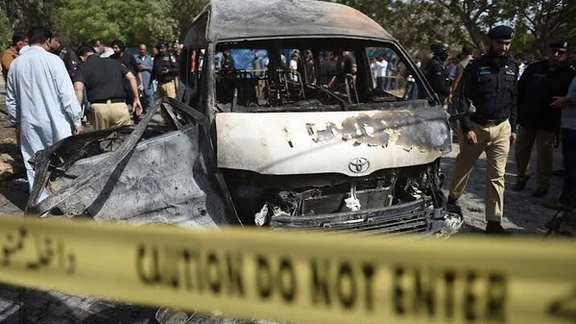
Iran has rejected a Pakistani official’s claim that a man killed in a gun battle Wednesday and suspected of a recent bomb attack in Karachi was trained in Iran.

Iran has rejected a Pakistani official’s claim that a man killed in a gun battle Wednesday and suspected of a recent bomb attack in Karachi was trained in Iran.
Iran’s embassy in Islamabad issued a statement Friday and dismissed allegations “made in public and in the media without providing any evidence, proof or documents to the government of the Islamic Republic of Iran through official means.” The statement called this “completely unprofessional and unacceptable.”
On Thursday, Syed Khurram Ali Shah, a senior official at the Counterterrorism Department in Sindh province, was quoted in a statement claiming that one of two militants – named as ‘Allah Dino’ – killed by Pakistani forces the previous day had been “taking instructions” from an Iranian commander named as Asghar Shah, “who operates his group from Iran, through phone calls, the video of which is available.”
Allah Dino, “an expert in making improvised explosive devices (IEDs)” had received his military training in Iran, the statement read.
At least one person was killed and several injured in the bombing May 12 in the Saddar quarter of Karachi. Responsibility was claimed by the little-known Sindhudesh Revolutionary Army (SRA), a group fighting for independence for the south-eastern Sindh. Iran and Pakistan have long traded accusations that the other harbors militants who launch attacks on the neighboring country.
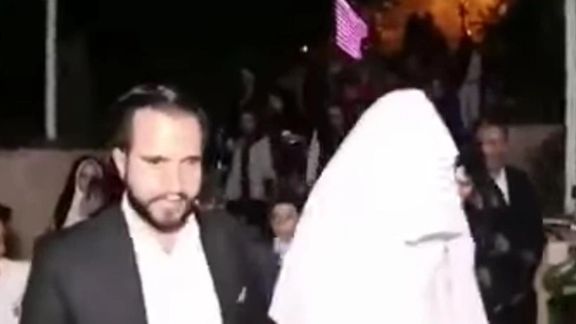
A spokesman of the Israeli army has told Iran International that the son of Hezbollah’s deputy is allegedly involved in transferring arms from Iran to Lebanon.
Reza Safieddine, Hisham Safieddine’s son, is married to Zeynab Soleimani, the daughter of Iran’s Revolutionary Guard general Ghasem (Qasem) Soleimani who was killed in a US air strike in Baghdad in January 2020.
Avikay Edri, an Israeli Defense Forces spokesman told Iran International's correspondent on Friday that Reza Safieddine arranges for weapons to be flown from Iran to Damascus on civilian flights and then arranges their transportation and delivery to Hezbollah in Lebanon.
His father who is the number two Hezbollah leader uses his political influence with the Lebanese government to ensure cooperation of officials and presumably security organs for making sure the deliveries are made without any complications.
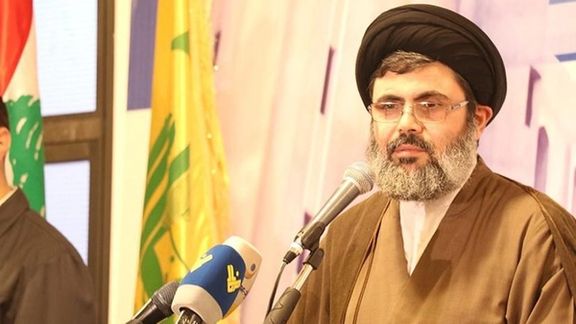
After the Iranian revolution in 1979 that overthrew the monarchy, the newly established Islamic Republic in the early 1980s created the Lebanese Hezbollah among the country’s Shiites amid lawlessness and civil war (1975-1990). The Hezbollah has been armed and financed by Iran since then as a potent weapon against Israel.
The Islamic Republic’s founder Ayatollah Ruhollah Khomeini and his disciples who have ruled in Iran are sworn enemies of Israel and have many times called for its destruction throughout the years. Iran has armed the Hezbollah with thousands of rockets and missiles threatening Israeli cities that are within the easy range of Shiite-dominated southern Lebanon where Hezbollah freely operates.
Edri also accused Reza Safieddine and the Hezbollah of endangering the lives of civilians by transporting weapons on airliners to Syria, which is a close ally of Iran.

Iran has extensively used its civil aviation to transport weapons and troops to Syria. The Revolutionary Guard controls several Iranian airlines, including one of the biggest Mahan. The United States sanctioned the company in 2011 for its role in the Syrian war.
In November 2020, a senior IRGC official Nosratollah Hosseinipur in a public ceremony had said, “You should know that in troop transportation to Syria it was the wide-body Mahan airliners that saved the day, by landing in Damasuc under enemy fire and disembarking troops.”
Israel has launched hundreds of air strikes at targets in Syria since 2017, mostly to destroy Iranian weapons shipments, which presumably also come overland from Iraq. Tehran has had a large military presence in Syria since 2011, when a revolt began against the ruling Assad family.
Israel has made it clear over the past few years that it will not accept Iran’s military entrenchment in Syria, especially near its northern borders in and around the Golan Heights.
Ghasem Soleimani played the main role in Iran’s involvement in the Syrian civil war, dispatching Revolutionary Guard high ranking officers, experts and both Iranian and proxy troops to defend the rule of Bashar Assad. He was Iran’s regional military and intelligence chief, also organizing Iraqi Shiite militias and helping Houthi rebels in Yemen against Saudi Arabia. When attacks against US interests increased in Iraq in the end of 2019, former US president Donald Trump ordered his killing.
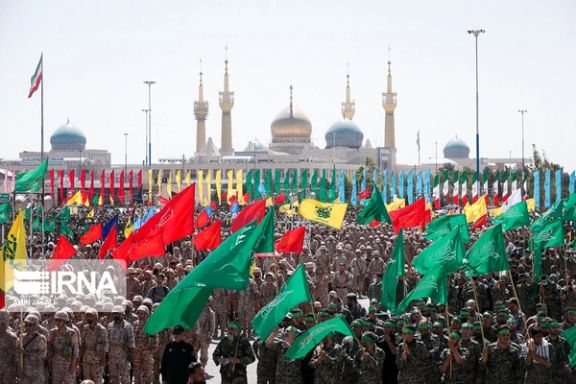
The Basij militia of the Revolutionary Guards (IRGC) began extensive urban exercises in various areas of the restive southwestern Khuzestan Province Thursday.
An IRGC official in Khuzestan, Colonel Mohammadreza Leilizadeh, said Thursday evening that 65 battalions of male and 28 battalions of female members of the Basij will be participating in the exercises.
A large gathering was also held at the Imam Khomeini tomb complex in Tehran by the IRGC's Sarallah force in Tehran, which is tasked to deal with protests and defend centers of government power in the capital.
Basij is one of the IRGC’s five forces, which partly consists of volunteers who receive military training under IRGC command. Armed Basij militia are often deployed to suppress protesters and have been accused of brutalizing protesters. In the past two weeks protesters have attacked at least two Basij headquarters in three small towns -- Hafshajan, Jouneghan, and Baba Heydar – in in Chahar Mahal and Bakhtiari Province.
The militia’s urban exercises come amid a tense security atmosphere and massive internet disruptions in most cities and towns of the oil-rich province where protesters took to the streets two weeks ago over the announcement of a massive hike in food prices. In the past two weeks at least two more protesters have been killed in Khuzestan.
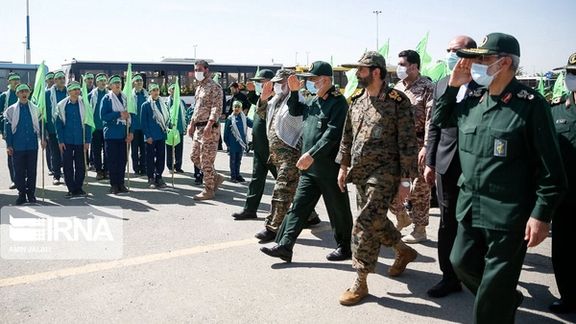
Security forces usually respond to protests with tear gas and excessive force, including lethal force, and arrest protesters even when they are demonstrating peacefully. Social media reports indicate that at least five protesters have been shot dead by security forces in western provinces since May 6.
Leilizadeh said the aim of the exercises is to improve the preparedness of the militia “to carry out real operations in social arenas throughout the region” and “psychological operations commensurate to the current circumstances” as well as “practicing individual combat technics.”
Protests in Khuzestan over water shortage last July lasted for several weeks and spread to other provinces. More than a dozen protesters were shot dead by security forces in these protests.
The recent protests in Khuzestan have also spread to mainly provinces, including Chahar Mahal and Bakhtiari where so far three protesters have been shot dead by security forces. The Human Rights Activists News Agency (HRANA), an independent human rights monitoring agency, reported on May 15 that protests had taken place in at least 19 cities and towns since May 6.
Leilizadeh also pointed out that similar exercises are being held throughout the country.
On Thursday the official news agency (IRNA) reported the commencement of similar exercises in the northwestern Ardabil province. The capital of the province, the city of Ardabil, was also the scene of anti-government protests last week.
Basij militia also held exercises in Golpayegan in the central Esfahan Province where people have also taken to the streets in the past few days to protest.
Security forces have arrested tens of political, civil, and labor activists in the past two weeks including some members of teachers’ unions on alleged charges of having “ties with terrorist groups’ and foreign spies.
“The arrests of prominent members of civil society in Iran on baseless accusations of malicious foreign interference is another desperate attempt to silence support for growing popular social movements in the country,” said Tara Sepehri Far, senior Iran researcher at Human Rights Watch. “Instead of looking to civil society for help in understanding and responding to social problems, Iran’s government treats them as an inherent threat.”
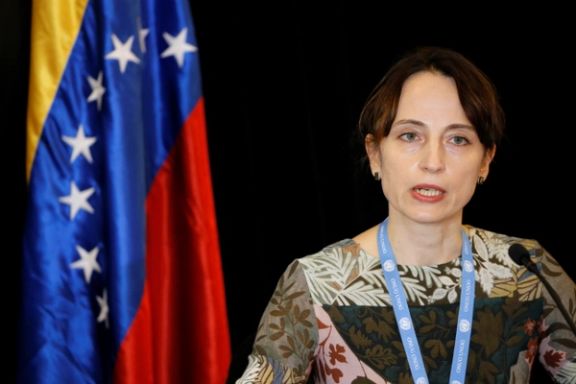
A watchdog organization has accused the UN Special Rapporteur on sanctions who recently visited Iran of receiving $200,000 from China to help whitewash its ethnic cleansing of the Uyghurs.
The UN Watch, self-proclaimed as a non-profit organization dedicated to holding the United Nations accountable to its founding principles, said on Wednesday that Alena Douhan, the UN Human Rights Council’s Special Rapporteur on the negative impact of unilateral coercive measures, last year received $200,000 from China according to disclosures buried in an 83-page UN document.
She secured the donation while she was using her UNHRC mandate to legitimize "the most extreme forms of Chinese disinformation", a Chinese-sponsored propaganda virtual event with the banner, “Xinjiang is a Wonderful Land”.
Covering up China’s herding of one million Uyghurs into camps by falsely portraying Xinjiang as a utopia, Douhan appeared on the show along with the Chinese ambassador to the UN in Geneva, Chen Xu, who claimed that "people of all ethnic groups in Xinjiang...live a life of happiness”.
On Wednesday, Dohan concluded a controversial 11-day visit to Iran in which she rejected appeals by Iranian rights activists to meet dissidents and turned a blind eye to the regime’s crackdown on the ongoing protests.
She chose instead to blame Iran’s poor human rights conditions on sanctions imposed by the US and other Western states in her report, that was hailed by the Islamic Republic’s authorities.
Since her appointment in March 2020, Douhan has mainly campaigned against the United States and its allies’ sanctions policy. She is a professor in Lukashenko-controlled Belarus State University, and has not criticized human rights violations in her native country.
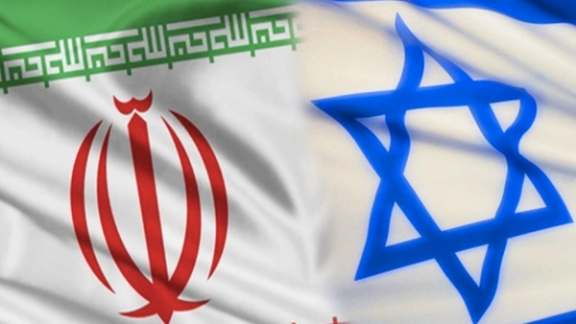
Israel’s security agency Shin Bet has uncovered an alleged plot by Iranian intelligence to lure Israeli academics and former defense officials to travel abroad in order to kidnap them.
The agency said on Thursday that Iranians contacted the Israelis while posing as academics, journalists, business people and philanthropists, using spoofed emails with the identities of real people living overseas who were unaware their names were being used.
The Iranian operatives used the stolen identities and relevant cover stories in an attempt to gather intelligence about Israelis and to invite them to locations abroad -- some under the guise of a conference -- in order to abduct or harm them.
“It is a well-known method of operation of the Iranian intelligence and security bodies, headed by the Intelligence Organization of the Revolutionary Guards, Quds Force and the Ministry of Intelligence,” the Shin Bet said.
In one case disclosed by the agency, Iranians invited the potential victims to a conference in Europe via email addresses similar to official institutes and with their logos, and in another case, the operatives pretended to be the assistant of a Russian billionaire, named “Nikolai” to contact Israelis of Russian descent and convince them to meet abroad.
Earlier this month, the Shin Bet said it uncovered an operation in which the Iranians had created a fake Facebook profile under the name of Sara Puppi, pretending to be a young Jewish girl with connections and business ties in Israel.
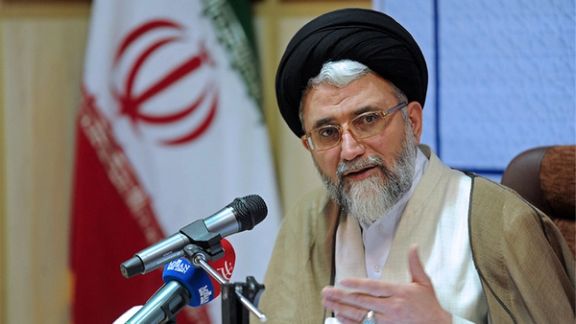
The Iranian intelligence minister on Thursday accused detained members of a teachers’ union of “contact with terrorist groups” and “spies residing abroad.”
“There is reliable information that some members of the said illegal groups had connection with known terrorist groups and certain spies who reside abroad and have been identified,” Esmail Khatib told a national gathering of prosecutors in reference to the arrest of some members of the Teachers Association.
The association has organized regular nationwide protests and strikes for better wages and working conditions as well as freedom for their colleagues arrested during the past year. The association recently said in a statement that the teachers' movement would not be subdued by security and judicial crackdowns on union activists.
Last week Iran's Intelligence Ministry announced the detention of two European nationals who have now been identified as French citizens Cécile Kohler, the head of the biggest federations of teachers' unions in France, and her partner Jacques Paris. The couple travelled to Iran as tourists and were arrested a few days later on their way to the airport.
Kohler is the head of the National Federation of Education, Culture and Vocational Training (FNEC FP-FO), a trade union representing education and related staff in France. Her partner Paris is also a member of the same union.
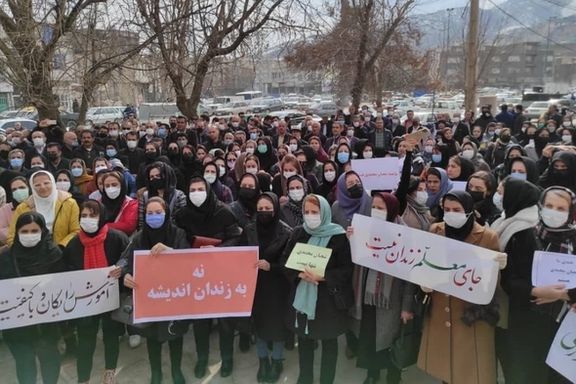
The French couple’s trip to Iran coincided with intensification of Iran’s crackdown on teachers’ protests and union activists over their latest round of widespread rallies which were held on May 1, the international Labor Day. The couple met with some members of the Coordination Council of Iranian Teachers’ Trade Unions (CCITTU) during their stay.
Iran's state television on Tuesday showed a 3-minute report on the recent arrest of the French couple, saying they were “spies” who "intended to foment unrest in Iran by organizing trade union protests".
Khatib said the two French nationals had come to Iran to create organizational connections between “illegal agitator groups (unions) … to fulfil the goals of [outlawed political] groups and [foreign] intelligence services under the guise of unions.”
In a statement Thursday, Defenders of Human Rights Center led by Nobel Peace Prize laureate Shirin Ebadi, condemned the French couple’s arrest and what it called Iran’s security forces “script” to suppress the teachers’ and workers’ protest movement by creating an atmosphere of fear. It underlined that contact with foreign nationals or labor unions is not a crime in any of the country’s current laws. “Depriving the nation from its fundamental freedoms with such unfounded and illegal accusations is clear proof of abuse of power,” the statement said.
Teachers’ Trade Association in a statement published Thursday said the CCITTU has been an official member of the FNEC FP-FO since it was formed and criticized the “script-writing” of security forces to use the meeting between the French teachers and their Iranian colleagues to crack down on their movement.
“The film [shown on the state television] intends to ascribe teachers’ protests to plots by western intelligence services to silence the justice-seeking voice of teachers,” the statement said while declaring that such scripts will only “result in the disgrace of those who write them.”
In the past few months people from different walks of life, including teachers, nurses, firefighters, and pensioners have held protestto demand better wages and pensions. On Monday bus drivers in the capital Tehran went on strike and Truck Owners and Drivers Union has also said they are planning a strike in the coming days.